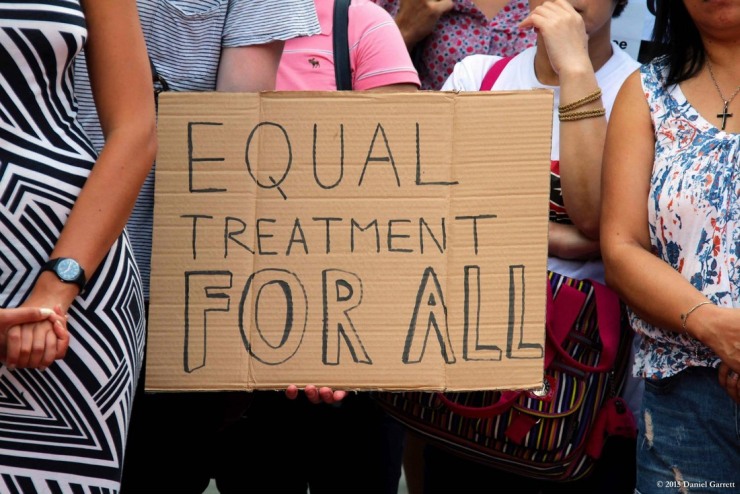By Virginie Goethals
The Hong Kong government is trying to profoundly change the immigration law without holding a meaningful debate with all those concerned. This is particularly concerning given that the changes could have far-reaching consequences for those seeking refugee status in Hong Kong, curtailing their fundamental rights.
Hong Kong, our beloved fragrant harbour, has been a safe haven in the past for refugees fleeing notably the Cultural Revolution and the aftermath of the Vietnam War in the 1960s and 1970s. Over one million refugees fled China and many Hong Kong families are descended from them.
Despite being a beacon of light for those fleeing human rights abuses abroad, Hong Kong is not a signatory to the UN 1951 Refugee Convention, which builds on the Universal Declaration of Human Rights. Instead, the city has developed its own screening system over time called the “Unified Screening Mechanism” as per its legal obligations under the Convention against Torture, the International Covenant on Civil and Political Rights, and relevant Court of Final Appeal rulings.
Over the years, Hong Kong has been reluctant to grant any additional protection to refugees and asylum-seekers beyond non-refoulement (protection against deportation for those with successful non-refoulement protection claims). As of September 2020, only 231 cases had been substantiated and granted protection under this system, which with a one per cent approval rate is one of the lowest in the developed world.
A new immigration bill proposal is now being pushed through quietly in the aftermath of civil unrest and a never-ending Covid-19 wave.
Everyone can agree that the existing policy and screening mechanism for non-refoulement claims can be improved but this should be done without curtailing fundamental human rights protections.

The bill has wide-ranging human rights implications for one of the most marginalised communities in Hong Kong – from militarising immigration officials, to curtailing the opportunity to submit evidence on appeal, negating the choice of procedural language, imposing mandatory medical examinations even for children and taking steps to organise repatriation and contacting the country of origin when a claim is rejected at first instance, just to name a few.
For Aisha , who suffered from sexual violence while fleeing her war-torn country in central Africa and has been forcibly separated from her children, the latter would mean a risk to the lives of her family members left behind.

The Amendment Bill gazetted by the Hong Kong Government on 4 December 2020 had its first committee meeting on January 19, with the second scheduled on February 5th. Unfortunately, the government is refusing to hold a public (virtual) debate on the bill. Civil society organisations and other stakeholders will only be allowed to make written representations. The lack of public debate is concerning given the substantive changes and the anti-refugee climate.
For example, the Secretary for Security, John Lee Ka-chiu, stated that “Non-refoulement claims bring troubles and disturbances to our society, and claimants are all those without the legal right to stay in Hong Kong, who also either entered Hong Kong illegally or overstayed their visas. Claimants assert that they will suffer from torture or inhuman treatment if they are removed to their country of origin”. Also, the head of Health Promotion at the Centre for Health Protection suggested that ethnic minorities are prone to engage in risky behaviour that could help spread the virus.

With the chances of a constructive debate fading, a wave of panic has been triggered amongst the refugee community this week. Even non-governmental organisations are worried about taking part in the debate since a frontline NGO worker was arrested under the national security law. However, some frontline workers with refugees are doing their best to reassure claimants, often already suffering from PTSD and related illnesses, that they will do the impossible and represent them in this debate.
Despite the atmosphere of tension and fear, a more cost-effective way to review the immigration law without curtailing fundamental human rights protections would still be to involve civil society organisations and stakeholders, and promote a public debate which recognises the diversity that makes Hong Kong so special.
Virginie Goethals is the General Secretary of Refugee Concern Network and co-founder of RUN Hong Kong, an NGO that rehabilitates refugees in Hong Kong through sports and education, with a special focus on women.
Support HKFP | Policies & Ethics | Error/typo? | Contact Us | Newsletter | Transparency & Annual Report | Apps
| HKFP is an impartial platform & does not necessarily share the views of opinion writers or advertisers. HKFP presents a diversity of views & regularly invites figures across the political spectrum to write for us. Press freedom is guaranteed under the Basic Law, security law, Bill of Rights and Chinese constitution. Opinion pieces aim to point out errors or defects in the government, law or policies, or aim to suggest ideas or alterations via legal means without an intention of hatred, discontent or hostility against the authorities or other communities. |
Help safeguard press freedom & keep HKFP free for all readers by supporting our team

More HKFP OPINION:
HKFP has an impartial stance, transparent funding, and balanced coverage guided by an Ethics Code and Corrections Policy.
Support press freedom & help us surpass 1,000 monthly Patrons: 100% independent, governed by an ethics code & not-for-profit.











